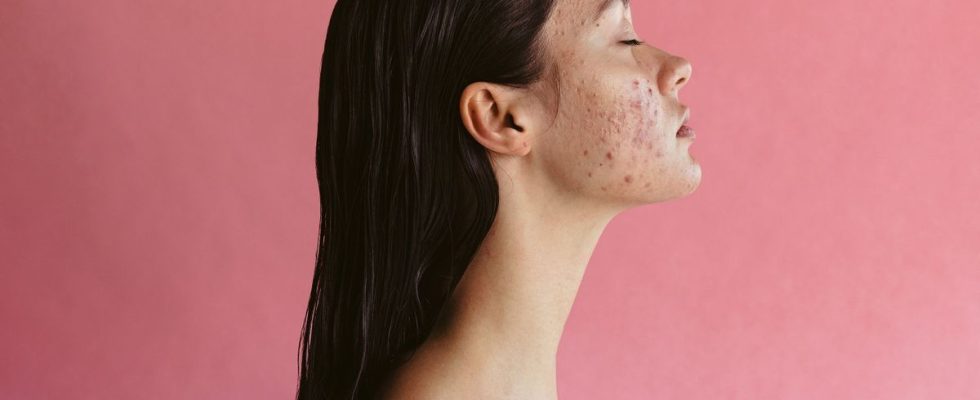Published on
Updated
Reading 3 min.
Is your moisturizer safe for acne? And your foundation? On TikTok, there are tons of videos asking these kinds of questions, using the hashtag “acne safe.” And tons who respond. But are the answers provided really reliable?
When we encounter skin problems, we are often tempted to turn to social networks to find the miracle solution. This is the case with acne, a skin disease which affects 640 million people worldwide, including around 85% adolescents, according to a study published in 2022 in the journal International Journal of Dermatology. On TikTok, this concern is reflected in the hashtag “acne safe” which has more than 230 million views. Behind this hashtag are lists of beauty and makeup products that are supposedly safe for acne and breakouts, with brands that come up often. However, in the comments of the videos posted, Internet users do not hesitate to denounce certain products which are not “acne safe”, specifying that such concealer contains ingredients that clog pores or that such concealer would give pimples.
“Acne safe” has no medical meaning
So how can you check the many tips and recommendations gleaned here and there on TikTok and really know if a beauty or makeup product is really “acne safe”? For Dr Anjali Mahto, a cosmetic dermatologist based in London, these products labeled “acne safe” are just part of a well-crafted marketing strategy. “Acne Safe” is used instead of “non-comedogenic”, that is, does not clog the pores of the skin, which otherwise could create excess sebum and promote appearance of pimples and blackheads. “It is a phrase used from a marketing or branding perspective, but it does not have a general meaning“, explains the spokesperson for the British Skin Foundation to Refinery 29. In other words, the term “acne safe” would not be legally defined and could therefore be used, as they wish, by brands, influencers or other beauty and makeup enthusiasts.
Even the statement indicating that a product has been clinically tested would not be a truly reliable indication, according to her. The number of volunteers would be too small and the skin types tested would not necessarily be acne-prone. “Generally, the product is applied to the skin of the back and then occluded. The skin is then monitored to see if [la personne] encounters problems such as the formation of small black dots“, explains Dr Anjali Mahto. Except that according to the expert, “the skin on the back is very different from that of the face” and can react differently to the same product.
Faced with acne, have the right reflexes!
To avoid unpleasant surprises and ensure that a product is “acne safe”, it is better to find out before buying it. If the product in question is featured on TikTok (or another social network), ask yourself the credibility of the source. Who shares the advice? A health professional or an influencer or a beauty enthusiast who will not have formal training?
Also, do not hesitate to look at the list of ingredients to ensure the safety of the ingredients. According to the site Healthline, benzoyl peroxide, resorcinol, salicylic acid and sulfur are some of the ingredients that are safe to not aggravate mild acne. And if you want to treat your skin problem using natural alternatives, oils based on sweet almond, sunflower, or neem are recommended.
Diet could also play a role in limiting the risk of acne, even if there are no formal scientific studies on this subject. Limiting dairy products and sugar (candies and cakes) would help prevent the appearance of spots. Instead, favor foods rich in Omega-3 (vegetable oils, fatty fish, green leafy vegetables), zinc (legumes, whole grains, nuts and oilseeds) and antioxidants (red fruits, cabbage, spinach, apples).
Keep in mind that acne is multifactorial, and that several elements can come into play such as genetics, hormones, stress or smoking.
